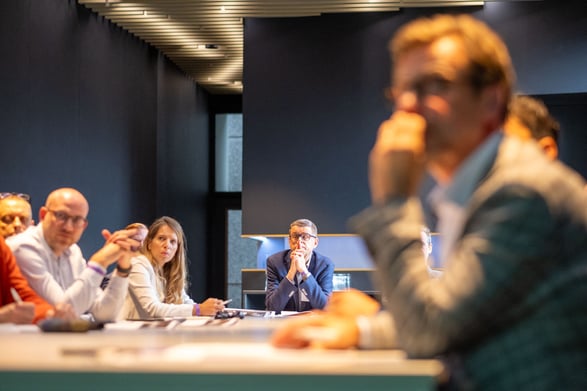.png)
The primary aim of this workshop was to explore whether DevOps holds the key to aligning development, operations, quality assurance, and security teams seamlessly, breaking down silos. In collaboration with 20 digital leaders, we delved into the necessary shifts in culture and mindset required to adopt DevOps. We also addressed questions on creating outcome-focused, purpose-driven teams to make products that resonate with customers.
Three speakers shared their perspectives, insights, and experiences in implementing DevOps, shedding light on challenges, best practices, and lessons learned:
Unfortunately, Bart Smets, CIO at Belfius Direct Insurance wasn’t able to join due to illness.
In our initial examination of the participants in the workshop, we observed that their organisations could be broadly categorised into four stages of DevOps maturity:
This categorisation allowed us to gauge where each organisation stood in their DevOps journey.
Chris Baynham-Hughes kickstarted the discussions by highlighting that, frequently organisations lose sight of the core objectives of DevOps, getting distracted by whether they are implementing the framework (DevOps, Agile, Lean, etc.) correctly rather than whether they are delivering the outcomes through the adoption of the framework. He stressed the need to focus on the desired outcomes, not the framework. He was joined by Sven Kosack, who oversees talent management at Euroclear's IT department, focusing on skill gaps, training, and recruitment strategies

Sven and Chris shared principles and practical steps that organisations can implement to deliver products that meet customer expectations. They emphasised that there is no one-size-fits-all solution and that the key is to find an approach that aligns with the organisation's context. They highlighted the challenges faced by development projects, including finding the right talent, managing budgets, timelines, quality, and customer needs. They also underscored the importance of minimising time-to-value, as the cost of delay is critical to market competitiveness.
Another pitfall discussed was organisations investing excessive time and resources in building platforms without understanding the immediate needs of their users (application development teams), whereas the focus should be on reducing the cognitive load and optimising the flow of work for developers. Chris and Sven used the analogy of American football, likening developers to quarterbacks who need to focus on throwing the ball accurately to add value on the pitch, rather than protecting themselves from the opposition. If they believe their teammates will block the opposition their cognitive load is reduced, and they can focus on delivering their value. They suggested that platforms help reduce cognitive load for engineers through services, tooling knowledge management, and pipeline management, enhancing the flow towards business value.
Euroclear shared a number of ways in which they work to reduce cognitive load and promote proven IT delivery patterns such as building trust so key decisions are made by the people closest to the information. One example was their biannual IT learning days to promote knowledge sharing among employees. These events allow collaborators to provide and attend training, share their experiences, and become advocates/ambassadors for the DevOps approach.
Chris then presented Red Hat's recommendations for practical DevOps implementation, based on customer experiences. These recommendations were successfully applied at Euroclear, as confirmed by Sven. Euroclear underwent a significant reorganisation, breaking down monolithic development programs into smaller cross-functional teams with greater autonomy.
Thomas Colyn, CISO at DPD Media, a mature DevOps practitioner, stressed the importance of a robust platform while advocating for the extension to DevSecOps to cover security requirements. He highlighted that there is no one-size-fits-all solution and that teams should adapt to their unique contexts. DPD Media has been practising agile and DevOps for five years, focusing on intensive collaboration among small teams. They are now exploring a platform for sharing development code and considering GitOps as an extension of DevOps practices.
Eduard de Bruijn, Director of Solution Architecture at Mendix, added insights from Mendix's analysis of customer success with their low-code platform. He emphasised that technology choices alone cannot guarantee success; they must be accompanied by measures to address their impact on the organisation and its people. Eduard also explained how DevOps complements low-code development, fostering a culture of purpose-driven developers.
We extend our gratitude to the workshop speakers and all participants for their contributions to this insightful event.
These Stories on CIONET Belgium
No Comments Yet
Let us know what you think